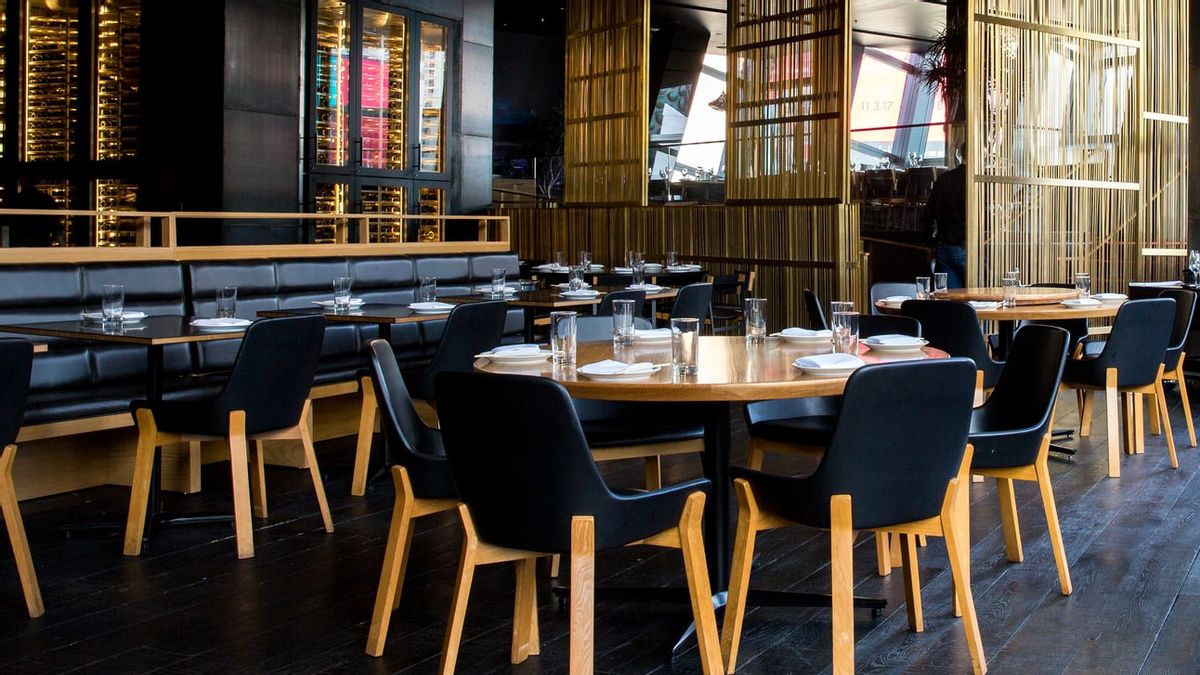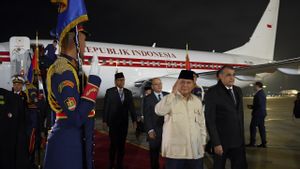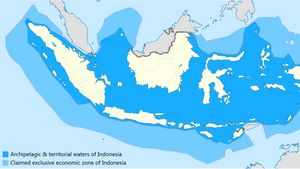JAKARTA - Recently there has been a trend of spreading COVID-19 through the dining table. Transmission occurs when one person eats together even though they have previously followed health protocols. Reflecting on this trend, a suggestion has emerged that the COVID-19 Task Force should consider banning on-site dining for restaurants.
This suggestion comes from the epidemiologist from Australia's Griffith University, Dicky Budiman. Where this rule reflects on what the Australian government is doing. In line with the increasing trend of spreading COVID-19 through the dining table.
This trend is also the same as that experienced by Doni Monardo, Head of the Task Force for Handling COVID-19. Some time ago Doni stated that he had contracted the virus after eating together during a visit to the location of a natural disaster.
Responding to Budiman's suggestion, Deputy Chairperson of PHRI for Restaurants, Emil Arifin, objected that his sector was considered a cluster of the spread of COVID-19. Therefore, he asked Budiman to show data based on studies and surveys stating that restaurants are currently winning to become a cluster for the spread of COVID-19.
"First, prove that the cluster (of the spread of COVID-19) occurred in a restaurant or in a mall. That was to prove there was no study, who did the survey," he said, when contacted by VOI, in Jakarta, Thursday, January 28.
Emil admitted that he had indeed received data from the COVID-19 registration that there was 30 percent of transmission in restaurants and shops. Even so, he said, there must be a distinction between restaurants and food stalls in terms of implementing health protocols.
"The question is, shops and restaurants cannot be equated. There are shops that apply health protocols. Meanwhile, restaurants, especially in malls, apply health protocols. You can check that the restaurant in the mall has double the health protocol. So there is very little transmission in the restaurant," he said.
Even if there is COVID-19 transmission in restaurants, said Emil, the first to be exposed are restaurant employees who are in charge of serving customers. However, he said, until now there has been no transmission of COVID-19 in the restaurant.
"In fact, until now there has not been any. Because we do check some every week, there are two weeks (once) rapid antigen test and all kinds," he said.
Therefore, Emil asked Budiman before suggesting the COVID-19 Task Force to enforce a restaurant rule that only take away, it was proven first with accurate data.
"So you should check the data first, not because one person eats (exposed to COVID-19), all (restaurants) are closed," he said.
Not all types of food can be taken awayEmil Arifin said that the restaurant's proposal to only serve take away or take-away cannot be implemented in all restaurants. Because, he said, restaurants have different food menus from one another.
"Not all foods can be taken away, for example, can you take steak away? It's not good if you take it away. Can Japanese food shabu-shabu be taken away or not? It's hard to make take out. So for martabak, pizza, vermicelli, The noodles can still take away, but other than that it's difficult, "he said.

Emil admitted that he was worried if this proposal was implemented by the government. Because, it can make employers reduce their employees and this will have an impact on increasing the number of unemployed.
[/ read_more]
"If it is applied, the labor force will decrease, unemployment will increase. Then if the restaurant is closed, where will the income come from? Nothing. Just from take away? Yes, it is better to close. Because it will not cover costs. How much is the rental fee, how much is the electricity cost? , no way, "he explained.
Restaurant entrepreneurs are willing to close, as long as the government pays employees salariesEmil said restaurant entrepreneurs were willing to close shops to avoid spreading COVID-19 through the dining table. However, there are conditions. He said the government must be willing to compensate employees.
"If you want to close it, you can, there is no problem. But give compensation to employees who work so that they will be given a salary subsidy while the restaurant is closed," he explained.
Not only employee salaries, Emil said, the government must also provide compensation to restaurant entrepreneurs in the form of fresh funds to pay rent to electricity bills.
"Likewise for the restaurant company, the rent is reimbursed, the service charge is changed. That's the minimum that compensation can be given to restaurant entrepreneurs," he said.
In the midst of the crisis due to the COVID-19 pandemic, Emil explained, entrepreneurs prefer to close their shops rather than stay open but with regulations only serving take away. Because, he said, 80 percent of a restaurant's income comes from dine-in or eating on the spot.
Therefore, said Emil, the restaurant is designed for people to sit down to eat on the spot. So chairs, tables, and others are provided. Meanwhile, income from take away is only 15 percent. So, if you have to rely on a take away system, it will be difficult for restaurant entrepreneurs to survive. In fact, in a situation where community activities are restricted, such as the current take away system sales have not increased.
"Earning from take away, from the past it has never increased from 15 percent. At least 10 to 15 percent from the past until now it has also not increased. Where does income come from? Nothing, right from take away? Yes, it's better to close. Because it won't work. cover costs. How much for rent, how much electricity costs, it's impossible, "he said.
Earlier, the epidemiologist from Australia's Griffith University, Dicky Budiman asked the COVID-19 Task Force to start considering banning on-site dining for restaurants and food courts. This policy is the same as that of the Australian government.
This was conveyed following the trend of spreading COVID-19 through the dining table. Later, many infections occur when one person eats together even though he / she has previously followed health protocols.
It was the same as experienced by Doni Monardo, Head of the Task Force for Handling COVID-19. Some time ago Doni stated that he had contracted the virus after eating together during a visit to the location of a natural disaster.
"Apart from socialization and education, regulations need to be strengthened. For example, you are not allowed to eat together or the setting is regulated. In Australia, for example, when the situation is still serious, there is no such thing as a food court to be opened or a restaurant to sit there. "said Dicky when contacted by VOI, Wednesday, January 27.
"So there is no public place where the seats can gather are opened and when it is violated there are sanctions," he added.
[/ read_more]
The English, Chinese, Japanese, Arabic, and French versions are automatically generated by the AI. So there may still be inaccuracies in translating, please always see Indonesian as our main language. (system supported by DigitalSiber.id)













